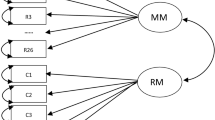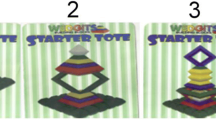Abstract
The present study addressed two research questions: (a) the extent to which students who were exposed to meta-cognitive instruction are able to implement meta-cognitive processes in a delayed, stressful situation, in our case—being examined on the matriculation exam; and (b) whether students preparing themselves for the matriculation exam in mathematics, attain a higher level of mathematics achievement and meta-cognitive awareness (knowledge about cognition and regulation of cognition) as a result of being exposed to meta-cognitive instruction. Participants were 61 Israeli high school students who studied mathematics for four-point credit on the matriculation exam (middle level). About half of the students (N = 31) were assigned to meta-cognitive instruction, called IMPROVE, and the others (N = 30) studied with no explicit meta-cognitive guidance (control group). Analyses included both quantitative and qualitative methods. The later was based on students’ interviews, conducted about a couple of months after the end of the intervention, immediately after students completed the matriculation exam in mathematics. Results indicated that IMPROVE students outperformed their counterparts on mathematics achievement and regulation of cognition, but not on knowledge about cognition. Furthermore, during the matriculation exam, IMPROVE students executed different kinds of cognitive regulation processes than the control students. The theoretical and practical implications of the study are discussed.
Similar content being viewed by others
References
Artz, A. F., & Armour-Thomas, E. (1992). Development of a cognitive–metacognitive framework for protocol analysis of mathematical problem solving in small groups. Cognition and Instruction, 9, 137–175.
Dignath, C., Buttner, G., & Langfeldt, H-P. (2007). The efficacy of self-regulated learning interventions at primary and secondary school level—a meta-analysis. Paper presented at the EARLI biennial conference in Budapest, Hungary.
Flavell, J. H. (1979). Metacognition and cognitive monitoring. American Psychologist, 34, 906–911.
Kelemen, W. L., Frost, P. J., & Weaver III, C. A. (2000). Individual differences in metacognition: evidence against a general metacognitive ability. Memory and Cognition, 28, 92–107.
Kramarski, B., Mevarech, Z. R., & Arami, M. (2002). The effects of meta-cognitive training on solving mathematical authentic tasks. Educational Studies in Mathematics, 49, 225–250.
Kramarski, B., & Mevarech, Z. R. (2003). Enhancing mathematical reasoning in the classroom: the effects of cooperative learning and meta-cognitive training. American Educational Research Journal, 40, 281–310.
Mevarech, Z. R. (1999). Effects of meta-cognitive training embedded in cooperative settings on mathematical problem solving. The Journal of Educational Research, 92, 195–205.
Mevarech, Z. R., & Kramarski, B. (1997). IMPROVE: a multidimensional method for teaching mathematics in heterogeneous classrooms. American Educational Research Journal, 34, 365–394.
Mevarech, Z. R., & Kramarski, B. (2003). The effects of worked-out examples vs. meta-cognitive training on students’ mathematical reasoning. British Journal of Educational Psychology, 73, 449–471.
Mevarech, Z. R., & Fridkin, S. (2006). The effects of IMPROVE on mathematical knowledge, mathematical reasoning and meta-cognition. Metacognition Learning, 1, 85–97.
Michalski, T., Zion, M., & Mevarech, Z. R. (2007). Developing students’ metacognitive awareness in asynchronous learning networks in comparison to face-to-face discussion groups. Journal of Educational Computing Research, 36, 421–450.
Pintrich, P. R., & de Groot, E. V. (1990). Motivational and self-regulated learning components of classroom academic performance. Journal of Educational Psychology, 82, 33–40.
Pintrich, P. R., & Shunck, D. H. (2002). Motivation in education: theory, research, and applications (2nd ed.). Englewood Cliffs: Prentice Hall.
Salomon, G., & Perkins, D. N. (1989). Rocky roads to transfer: rethinking mechanisms of a neglected phenomenon. Educational Psychologist, 24, 113–142.
Schoenfeld, A. H. (1985). Matheamtical problem solving. San Diego, CA: Academic.
Schraw, G. (1994). The effect of metacognitive knowledge on local and global monitoring. Contemporary Educational Psychology, 19, 143–154.
Schraw, G., & Dennison, R. S. (1994). Assessing meta-cognitive awareness. Contemporary Educational Psychology, 19, 460–475.
Schraw, G., Dunkle, M. E., Bendixen, L. D., & Roedel, T. D. (1995). Does a general monitoring skill exist? Journal of Educational Psychology, 87, 433–444.
Shamir, A., Gida, C., & Mevarech, Z. R. (2008). The assessment of meta-cognition in different contexts: individualized and peer assisted learning. Paper presented at the annual meeting of AERA, NY.
Veenman, M. V. J., Elshout, J. J., & Busato, V. V. (1994). Meta-cognition mediation in learning with computer-based simulation. Computers in Human Behaviour, 10, 93–106.
Veenman, M. V. J., Elshout, J. J., & Meijer, J. (1997). The generality vs. domain-specificity of metacognition skills in novice learning across domains. Learning and Instruction, 7, 187–209.
Veenman, M. V. J., Van Hout-Wolters, B. H. A. M., & Afferbach, P. (2006). Metacognition and learning: conceptual and methodological considerations. Metacognition and Learning, 1, 3–14.
Volet, S. E. (1991). Modelling and coaching of relevant metacognitive strategies for enhancing university students’ learning. Learning and Instruction, 1, 319–336.
Author information
Authors and Affiliations
Corresponding author
Appendix
Appendix
Examples of a pre-test item:
-
1.
A person deposits 45,000 NIS in a saving program giving a yearly interest of 8%. After 1 year, the person took out from the saving account 2,000 NIS and the rest remained in the same saving program for the same interest. How much money did the person save 2 years after the first deposit?
-
2.
Radioactive material loses every month 1/5 of its weight. The radioactive material weighs today 625 g. How much will it weigh after 1 month?
Example of a post-test item
-
1.
A farmer grows fish in pools. The amount of fish grows every month by 14%. At a certain date, there were 12.3 tons fish in the pools. The fish continues to grow for 6 months and then 10 tons of it was sold. The remaining fish continues to grow for six more months and then all fish was sold. How much fish was sold the next time?
-
2.
Sea Weeds are multiplied by algorithmically. In the first measurement, there were 6*104 kg weeds. After 5 years, there were 4*106 kg weeds. How much weeds will be in the lake 9 years after the first measurement?
Rights and permissions
About this article
Cite this article
Mevarech, Z.R., Amrany, C. Immediate and delayed effects of meta-cognitive instruction on regulation of cognition and mathematics achievement. Metacognition Learning 3, 147–157 (2008). https://doi.org/10.1007/s11409-008-9023-3
Received:
Accepted:
Published:
Issue Date:
DOI: https://doi.org/10.1007/s11409-008-9023-3




